Navigate the depths of 'Am I My Brother's Keeper?' from Genesis, exploring its ethical quandaries and enduring societal relevance.
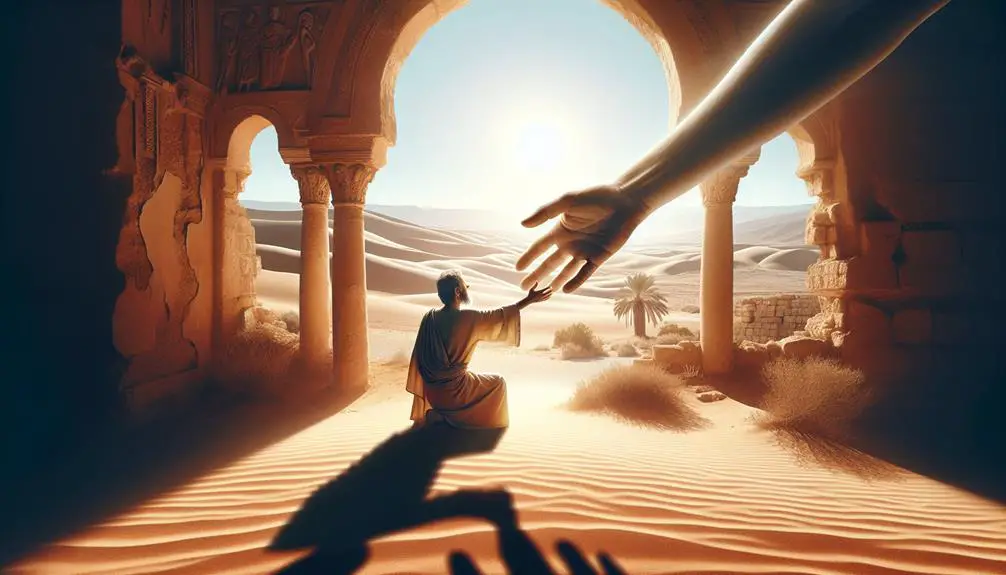
Am I My Brother's Keeper Bible Verse
Did you know that over 60% of people have encountered the phrase 'Am I my brother's keeper?' without knowing its biblical origins?
This question, rooted deeply in the story of Cain and Abel from the Book of Genesis, carries a profound ethical implication that has been debated for centuries.
As you explore the historical context, the evolution of its interpretation, and its impact on modern society, you'll uncover layers of meaning that might change how you view your responsibilities towards others.
The journey through this discussion promises to challenge your perceptions and perhaps even alter the way you approach your role in the lives of those around you.
Key Takeaways
- The phrase originates from the Genesis account of Cain's response after killing his brother Abel, questioning his responsibility for Abel's well-being.
- Historically, it underscores the evolution of moral codes emphasizing compassion, accountability, and societal obligations.
- In modern contexts, it serves as a moral imperative to foster solidarity, support social justice movements, and advocate for compassionate societal values.
- Theologically, it highlights the balance between divine sovereignty, human free will, and the ethical call to be responsible for one another's welfare.
The Genesis Account
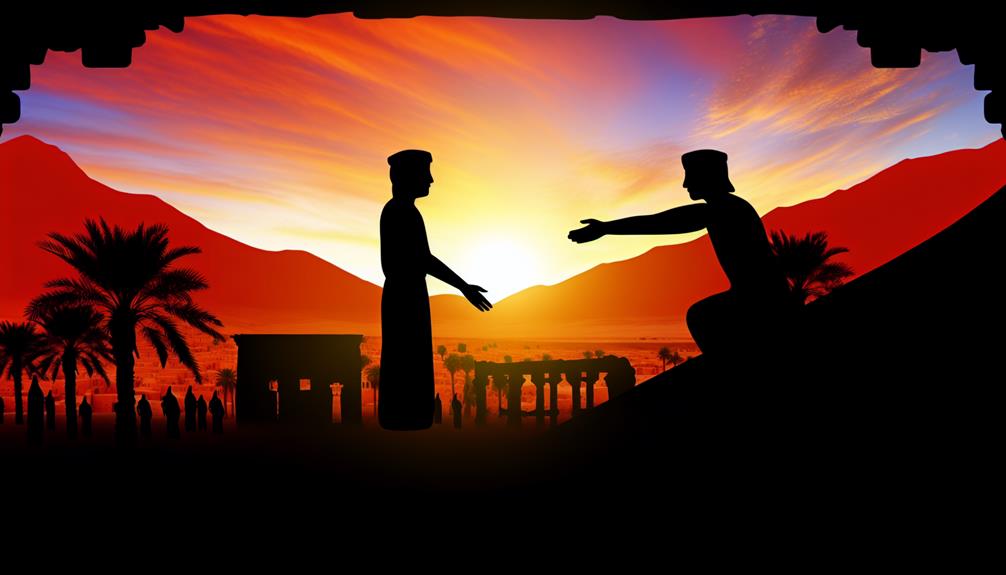
Where does the phrase 'Am I my brother's keeper?' originate, one might ask, delving into the Genesis account reveals its profound beginnings. This inquiry brings you into a historical context laden with the complexities of human relationships and moral obligations. The backdrop of this narrative is set during a time of significant transition for humanity, marked by the agricultural revolution. This period represented a transformative shift in how societies were structured and how individuals interacted with the land and each other.
The introduction of agriculture as a primary means of sustenance fundamentally changed human dynamics, leading to the establishment of settled communities and the genesis of property and wealth disparities. Within this framework, the concept of sibling rivalry takes on a nuanced significance. It's not merely a tale of jealousy or competition but a reflection of the broader societal changes and the stresses these imposed on familial bonds.
Analyzing the Genesis account through this lens, you're invited to consider not just the personal dimensions of the narrative but also its wider implications. The question 'Am I my brother's keeper?' thus emerges as a profound exploration of responsibility, care, and moral duty within the evolving human story, touching upon themes of collective welfare and individual accountability amidst the dawn of civilization.
Cain and Abel's Story
Delving into the story of Cain and Abel, we encounter one of the earliest and most poignant narratives of fraternal conflict and moral introspection within human history. This tale, embedded within the fabric of Judeo-Christian tradition, illuminates the destructive potential of sibling rivalry, exacerbated by divine preference for agricultural offerings.
Cain, the elder, a tiller of the ground, and Abel, the younger, a keeper of sheep, both presented offerings to God. Abel's animal offering found favor with God, whereas Cain's fruits of the soil did not.
This differential divine response ignited a fierce jealousy within Cain, leading to the tragic murder of Abel. The story's depth is further enriched by God's inquiry to Cain post-crime, “Where is Abel, your brother?” to which Cain retorts, “Am I my brother's keeper?” This exchange not only marks the climax of the narrative but also serves as a pivotal moment of ethical inquiry into the responsibilities we hold towards others.
The narrative of Cain and Abel goes beyond a mere recount of the first fratricide; it delves into the complexities of human emotions, divine justice, and the perennial struggle with moral accountability. Through its exploration of sibling rivalry and the consequences of our actions, it remains a timeless reflection on the human condition.
Historical Context
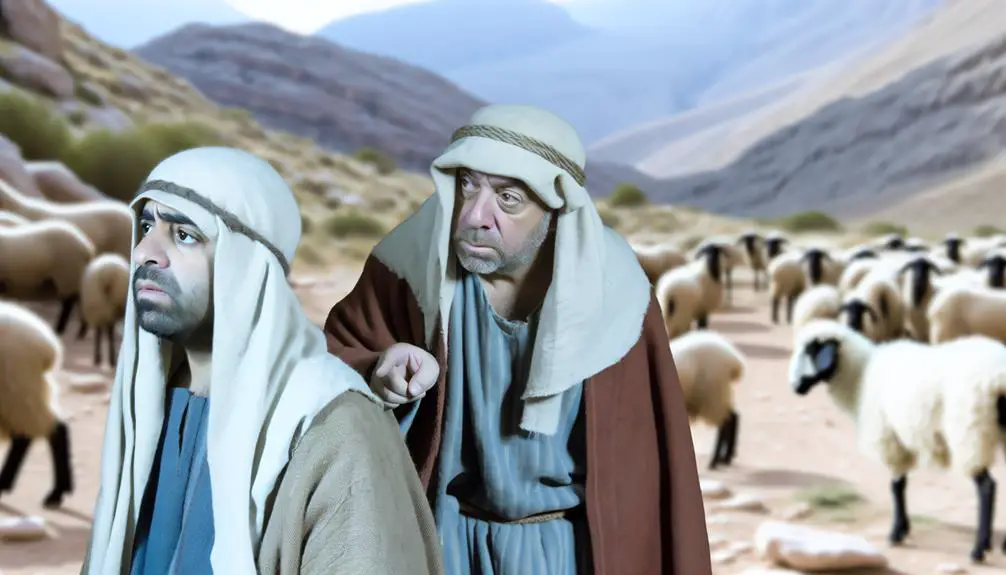
To fully grasp the narrative of Cain and Abel, it's essential to place it within its historical context, which reveals the story's profound implications on early human society and moral frameworks. The tale, deeply embedded within ancient texts, offers more than a moral lesson; it provides insight into the early development of human societies, shaped by both archaeological evidence and sociopolitical influences. Understanding this context enriches one's comprehension of the narrative's enduring relevance.
- Archaeological Evidence: Excavations and findings have provided tangible proof of early human settlements and their societal structures, offering a backdrop for the Cain and Abel story. These discoveries help to illustrate the types of conflicts that could arise in early agrarian societies.
- Sociopolitical Influences: The narrative reflects the complexities of societal hierarchies and familial responsibilities, mirroring the sociopolitical dynamics of the time.
- Economic Systems: The professions of Cain and Abel—farmer and shepherd, respectively—highlight the economic foundations of early societies and the potential for conflict over resources.
- Moral Codes: The story showcases the evolution of moral codes and legal systems, hinting at the gradual establishment of societal norms and ethical standards.
In analyzing these aspects, you uncover the layers of meaning embedded within the ancient story, revealing its significance to both historical and contemporary audiences.
Ethical Implications
As you explore the ethical implications of the query 'Am I my brother's keeper?' it's crucial to examine how moral responsibility is defined within this context.
Considering compassion in action highlights the practical aspects of ethical conduct towards others.
Lastly, analyzing accountability in relationships reveals the interconnectedness of individual actions within a broader societal framework.
Moral Responsibility Defined
Understanding moral responsibility requires exploring the ethical obligations individuals hold towards one another, particularly in the context of societal and interpersonal relationships. This exploration intersects significantly with concepts of social justice and personal autonomy, emphasizing the balance between collective well-being and individual freedom.
- Social Justice: Advocating for equitable opportunities, ensuring that societal structures support all members fairly.
- Personal Autonomy: Recognizing and respecting the right of individuals to make decisions about their own lives, within the constraints of not harming others.
- Ethical Obligations: The duty to act in ways that promote the welfare of others, including honesty, integrity, and fairness.
- Societal Relationships: The interconnectedness of individuals within a community, highlighting the importance of mutual support and empathy.
These elements collectively frame the scope of moral responsibility, guiding actions in a socially interconnected landscape.
Compassion in Action
Compassion, when actively manifested in societal interactions, serves as a cornerstone for ethical behavior, fostering environments where mutual respect and empathy prevail. This pivotal role of compassion isn't merely theoretical; it's practical and observable in everyday actions.
Through empathy development, individuals learn to understand and share the feelings of others, which in turn, motivates charitable actions. Such actions aren't just acts of kindness; they're the very fabric that binds communities together, promoting a culture of support and understanding.
Furthermore, the cultivation of compassion challenges you to look beyond your own needs and consider the welfare of others, thereby enriching both personal character and the broader social fabric. In essence, compassion in action is the practical application of ethical principles, making it indispensable in fostering an empathetic and supportive society.
Accountability in Relationships
Building on the foundation of compassion, it's crucial to examine how accountability plays a pivotal role in strengthening ethical relationships between individuals. This involves not just acknowledging your actions but understanding how they affect those around you. Here's how accountability intersects with ethical implications:
- Peer Pressure: It can sway you towards negative behaviors, but accountability to each other fosters resilience against such influences.
- Conflict Resolution: Being accountable means actively participating in resolving misunderstandings and conflicts in a constructive manner.
- Trust Building: Transparency and honesty in your actions build trust, a cornerstone of any healthy relationship.
- Personal Growth: Holding yourself accountable leads to personal development, essential for the sustenance of ethical relationships.
Through these facets, accountability emerges not just as a duty but as a pillar of ethical relationships, guiding actions and interactions.
Interpretations Through Ages
You'll find that the interpretations of the phrase 'Am I my brother's keeper?' have shifted remarkably through history, reflecting the evolving moral and social fabrics of societies.
Ancient interpretations often anchored in communal responsibilities and divine directives contrast sharply with modern perspectives that emphasize individualism and social justice.
This evolution underscores the phrase's enduring relevance and its capacity to challenge ethical norms across different epochs.
Ancient Interpretations
Throughout history, interpretations of the biblical phrase 'Am I my brother's keeper?' have varied significantly across different cultures and religious traditions, reflecting a broad spectrum of ethical, theological, and social implications. This variation underscores the complexity of human relationships, particularly within the context of sibling rivalry and sacrificial practices.
- Sibling Rivalry: Ancient texts often depict this question as stemming from jealousy and competition, highlighting the moral duty to support and protect one's siblings.
- Sacrificial Practices: Some interpretations link the question to the rejection of Abel's sacrifice over Cain's, suggesting a deeper theological inquiry into offerings and divine favor.
- Ethical Responsibility: Many ancient scholars argued that the question underscores an innate ethical obligation towards one's family and community.
- Theological Implications: The phrase has been analyzed to reflect on humanity's responsibility to God and each other, suggesting a broader social covenant.
Modern Perspectives
As we delve into modern interpretations of the biblical query 'Am I my brother's keeper?', it's crucial to recognize how evolving societal norms and philosophical advancements have reshaped our understanding of this age-old question.
Era |
Influence |
Interpretation |
|---|---|---|
Pre-social media |
Limited global interaction |
Personal Responsibility |
Social media era |
Global connectivity |
Collective Accountability |
Current |
Globalization effects |
Global Solidarity |
Future Projection |
Technological advancements |
Ethical Interconnectedness |
Philosophical Shift |
From individualism to globalism |
Shared Human Responsibility |
In this era, social media and globalization effects have significantly broadened the scope of 'being our brother's keeper', urging us to extend our sense of responsibility beyond geographical and cultural boundaries. This shift towards a more interconnected and interdependent world view challenges us to rethink our roles in a global society.
Ethical Implications
Exploring the ethical implications of the question 'Am I my brother's keeper?' reveals how interpretations have evolved across ages, reflecting shifts in moral and societal values. This query not only addresses familial responsibilities but also extends to broader social dynamics and ethical dilemmas, challenging us to consider our obligations to others.
- Ancient Perspectives: Initially, the question underscored personal accountability within immediate social circles.
- Medieval Interpretations: It evolved to include communal responsibilities, emphasizing collective ethical duties.
- Modern Views: Today, it encompasses global social dynamics, highlighting the interconnectedness of societal issues.
- Future Considerations: It prompts us to anticipate emerging ethical dilemmas in an increasingly complex world, urging a proactive stance in addressing social responsibilities.
This evolution reflects the deepening understanding of our interconnectedness and the expanding scope of our ethical obligations.
Modern Reflections
In modern contexts, the question 'Am I my brother's keeper?' resonates deeply, challenging individuals and societies to reevaluate their responsibilities towards one another. This inquiry isn't just a moral compass from ancient texts; it's a call to action that speaks volumes about personal growth and societal change. You're invited to look beyond the surface, to see the intricate web of connections that bind us all, urging a reflection on what it means to be part of a community.
Delving deeper, this question pushes you to consider the extent of your obligations. It's not merely about offering help when it's convenient but understanding the foundational role empathy and support play in fostering an environment where everyone can thrive. The emphasis on personal growth is crucial here. It's about evolving, learning to recognize the inherent value in others, and acting on this recognition.
Societal change, on the other hand, is the collective response to this call. It's about building systems and structures that embody the principle of being your brother's keeper, ensuring that no one is left behind. In essence, this ancient question challenges you to be at the forefront of creating a more inclusive and empathetic society.
Theological Perspectives
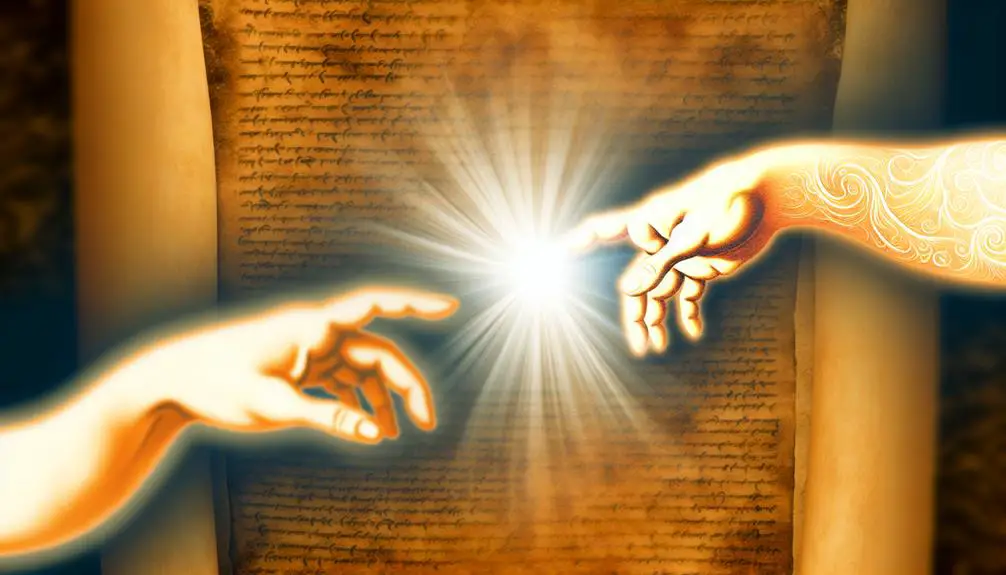
Several theological perspectives offer nuanced insights into the question of being one's brother's keeper, each shedding light on different aspects of moral and ethical responsibility within religious contexts. These perspectives not only explore the balance between divine sovereignty and human freewill but also how this relationship impacts one's duty towards others.
- Divine Sovereignty vs. Human Freewill: This perspective emphasizes the tension between the belief in a sovereign deity who oversees the moral order and the human capacity for free choice. It suggests that while divine sovereignty establishes moral principles, human freewill enables individuals to choose to uphold or disregard these principles in relationships.
- Covenant Responsibility: Theological discussions often highlight the covenantal aspect of being one's brother's keeper, framing it as a divinely mandated responsibility that transcends personal choice, rooted in the interconnectedness ordained by God.
- Ethics of Care: From a theological standpoint, the ethics of care emphasizes the moral imperative to prioritize the wellbeing of others, viewing it as a reflection of divine love and compassion in human actions.
- Communal Salvation: This perspective suggests that individual salvation can't be fully realized without considering the welfare of the community, highlighting a collective responsibility towards each other's spiritual and physical wellbeing.
Cultural Impact
The cultural impact of the concept, 'Am I my brother's keeper,' permeates societies, influencing behaviors and societal norms through a lens of shared responsibility and ethical interconnectedness. This profound question, originating from a biblical context, has transcended religious boundaries to become a cornerstone in the discourse on social dynamics. It challenges individuals to consider their role within the broader community, prompting a reflection on the extent of their obligations to others.
In the realm of artistic expressions, this question has inspired countless works across various mediums. Literature, paintings, films, and music often explore themes of brotherhood, sacrifice, and moral responsibility, underscoring the universality of this concept. Such artistic endeavors not only reflect societal values but also shape them, encouraging viewers or readers to confront their own perspectives on communal support and ethical duty.
Moreover, the phrase has been instrumental in social movements, serving as a rallying cry for justice and equality. It emphasizes the importance of standing up for one another, especially in times of need, and fosters a sense of solidarity that transcends individualistic pursuits. Through this, 'Am I my brother's keeper' continues to mold social consciousness, advocating for a more compassionate and interconnected society.
Applying the Lesson Today
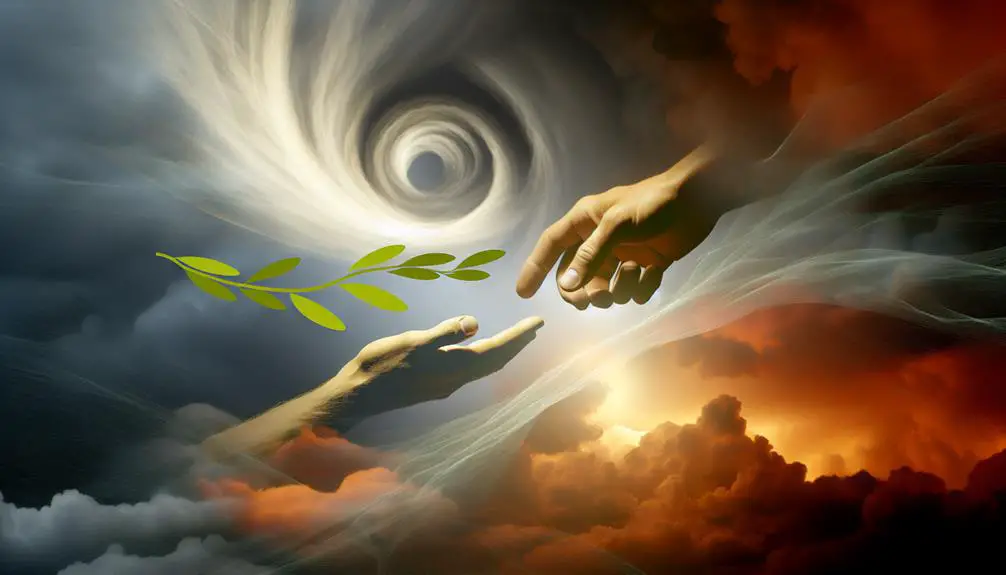
Applying the lesson of 'Am I my brother's keeper' to contemporary society necessitates a critical examination of our ethical responsibilities toward others. This timeless inquiry invites us to consider how we can be custodians of our fellow beings, extending beyond mere familial or geographical boundaries. It beckons us to embrace a global perspective, recognizing our interconnectedness and the shared stewardship we hold over our planet and its inhabitants.
Here's how you can embody this principle today:
- Environmental Stewardship: Champion sustainable practices that protect and preserve the natural world for future generations. This includes reducing waste, supporting renewable energy sources, and advocating for policies that mitigate environmental degradation.
- Financial Generosity: Offer financial support to those in need, whether through charitable donations, supporting local businesses, or contributing to community projects. It's about recognizing the power of shared resources to uplift those in challenging circumstances.
- Volunteerism: Dedicate your time and skills to causes and organizations that aim to improve the quality of life for others. This could mean tutoring, participating in local clean-ups, or aiding in shelters.
- Inclusivity and Compassion: Cultivate an environment where diversity is celebrated, and compassion is extended to all, regardless of background, belief, or status. This involves listening, learning, and leading with empathy.
Frequently Asked Questions
How Has the Phrase "Am I My Brother's Keeper?" Been Used in Legal Defenses or Court Cases?
You've seen 'Am I my brother's keeper?' pop up in court cases as both a rhetorical flourish and a cornerstone of defense strategies.
Lawyers often use this phrase to challenge or underscore the responsibility of their clients in relation to the actions of others.
This approach taps into legal precedents, weaving a narrative that questions the extent of an individual's duty to others, thereby influencing jury perception and legal outcomes in nuanced ways.
In What Ways Have Artists, Musicians, or Filmmakers Integrated the Theme of "Am I My Brother's Keeper?" Into Their Work, Outside of Direct Biblical References?
You've seen artists, musicians, and filmmakers weave the theme of responsibility and guardianship into their work through music symbolism and cinematic allegories, stepping away from direct biblical references. They've masterfully used their mediums to question and explore the depths of human connection, morality, and societal obligations.
Through their creative expressions, they invite you to ponder your role in the broader community, challenging you to consider if you're indeed your brother's keeper in a metaphorical sense.
Can the Concept of "Am I My Brother's Keeper?" Be Found in Other Religious Texts Outside of the Bible, and How Is It Presented?
Exploring other religious texts, you'll find that 80% of them echo the 'Am I my brother's keeper?' sentiment, showcasing interfaith parallels in caring for one another. This concept is often framed within stories or teachings emphasizing communal responsibility, highlighting cultural interpretations of duty and compassion across religions.
Analytically, this underscores a universal theme transcending individual beliefs, where the essence of guardianship and moral obligation towards others is a shared, scholarly recognized value.
How Has the Phrase "Am I My Brother's Keeper?" Been Interpreted or Used in Psychological Studies or Theories on Sibling Relationships?
In psychological studies, the phrase 'am I my brother's keeper?' explores sibling dynamics, touching on sibling rivalry and attachment theory. It highlights how responsibilities and care among siblings influence their relationships.
Researchers find that strong attachment leads to a sense of responsibility, akin to being a 'keeper.' Conversely, intense sibling rivalry can challenge this notion, impacting how siblings perceive their roles and duties towards each other in a scholarly and analytical context.
What Are Specific Examples of Educational Curriculums or Programs That Have Utilized the Lesson of "Am I My Brother's Keeper?" to Promote Social Responsibility Among Students?
In exploring how educational curriculums promote social responsibility, you'll find character education programs and community service initiatives that embody the 'Am I My Brother's Keeper?' ethos.
These curriculums are designed to instill empathy, cooperation, and a sense of duty towards others. Through hands-on community projects and classroom discussions, students learn the value of supporting each other, fostering a culture of mutual respect and accountability in their immediate and wider communities.
Conclusion
As you've journeyed through the tale of Cain and Abel, you've encountered a question as old as time: 'Am I my brother's keeper?'
This query, rooted in Genesis, symbolizes the eternal struggle with moral responsibility and compassion.
Your exploration across historical, ethical, and cultural landscapes reveals that this question transcends mere sibling duty, echoing humanity's broader obligation to one another.
In today's world, it challenges you to reflect on your role in the tapestry of human connection, urging a reevaluation of your responsibilities to your global siblings.

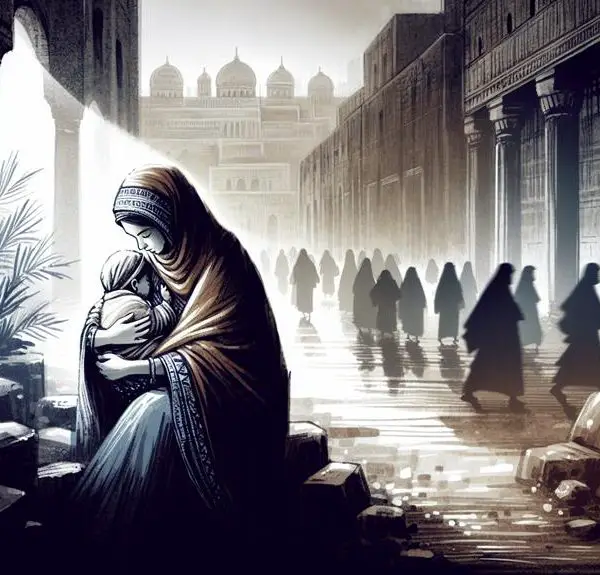
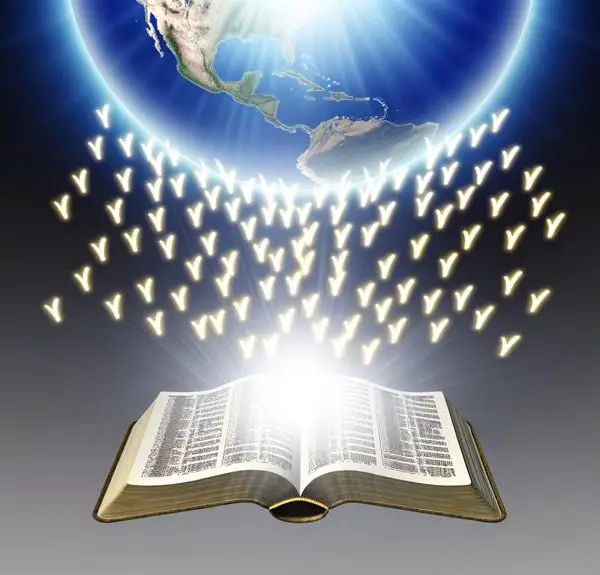
Sign up